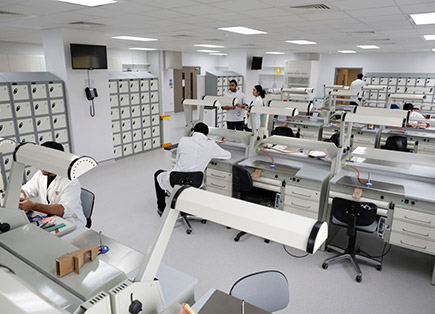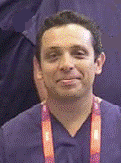Study options
- Starting in
- September 2025
- Location
- Whitechapel
- Fees
- Home: £15,250
Overseas: £31,500
EU/EEA/Swiss students
What you'll study
This MSc will give you an in-depth knowledge of dental technology, CAD-CAM, implantology, occlusion, aesthetics and materials. You’ll be taught by our clinical consultants, chief technicians and dental/biomaterials experts in the Institute of Dentistry.
You’ll be taught alongside our clinical postgraduate students, giving you an opportunity to benefit from an exchange of ideas and practice.
You’ll also gain hands-on practical experience by attending implantology clinics and in your technical practice sessions.
You’ll work on research under a supervisor and undertake a laboratory-based project in the final module of the programme. The research skills you gain on this course will give you a firm foundation for a PhD or a career in industry.
Please note that for intercalating BDS students, Queen Mary students must apply by 1 February and complete an intercalated application in addition to the MSc application. Following the February deadline for iBSc applications external students are free to continue to apply for MSc degrees via the Postgraduate Taught Course online application process. Find out more about applying for an intercalated degree.
Structure
- Seven compulsory modules
- Research project and report
Compulsory/Core modules
The module will initially provide students with a introduction to research, including qualitative and quantitative paradigms, methodology, validity and reliability and support them to choose their research projects which are in the areas of their discipline.
This module introduces students to the occlusal concepts for Prosthodontics. Subjects covered in seminars are anterior/posterior occlusion, group function, balanced occlusions and conformative and re-organised occlusions. TMJ and managing occlusal changes and articulation. This module is based on the theory of occlusion, which will be applied to the technical practice cases carried out in the laboratory including: Setting up dentures; Occlusal splints; Diagnostic/occlusal waxing; Impressions, casts, facebows and mounting for analysis of cases.
This is a core module delivered in the Master of Science (MSc) in Dental Technology which is designed to ensure students are taught about the use of osseointegrated implants to stabilise or support fixed or removable prostheses. Subjects covered are: History & Development of Implantology, Osseointegration Surface Topography; Patient Assessment and Restorative Driven Planning for Implant Restorations; Imaging & Implantology; Diagnostic Wax ups, Radiographic stent, surgical stents; Implants in Anterior Maxilla, Guided Bone Regeneration, Socket Preservation; Soft Tissue Augmentation; Surgical and restorative Procedures; Maintenance of Implants and Implant Restorations; Fixed/removeable implant construction. Practicals: Radiographic Tracing Pouring working casts. Making Provisional Restorations. Customising Impression copings. Implants restorations may be constructed as part of the technical practice.
This is a core module delivered in the Master of Science (MSc) in Dental Technology which is designed to ensure students are taught the basic principles of the factors that affect aesthetics in Restorative Dentistry including; Light, colour and shade selection, Basic restoration aesthetics (understanding and designing tooth shape and form and use of colour effects), Ethical aesthetics, Denture aesthetics, Maxillo facial aesthetics, Implant aesthetics. Practicals; Shade selection and designing a colour map. Diagnostic waxing, Denture gingival staining, contouring/stippling techniques. Porcelain building techniques to achieve aesthetics. Techniques may be taught one to one during the technical practice sessions to enable the student to complete their advanced case presentation.
This module involves advanced laboratory Technical practice in order to produce a complex dental prosthesis for case submission. Students will tackle a multitude of Technical exercises in order to achieve this and will receive one to one teaching where necessary.
This is a core module delivered in the Master of Sciences (MSc) in Dental Technology, Oral Biology and Dental Materials (the latter jointly accommodated by the Institute of Dentistry, Barts and the London School of Medicine and Dentistry, and The School of Engineering and Materials Science). It is designed to enable students to gain a greater and more in depth understanding of the basic sciences knowledge that underpins the clinical uses of dental materials. Topics covered include chemical, mechanical, surface properties and other physical property tests used for dental biomaterials, as well as basic ceramic science, basic polymer science and basic metallurgy. Water absorption and the biocompatibility of dental materials are also covered in detail.
This is a core module delivered in the Master of Sciences (MSc) in Dental Technology and Dental Materials (the latter jointly accommodated by the Institute of Dentistry, Barts and the London School of Medicine and Dentistry, and the School of Engineering and Materials Science). This module is designed to ensure students gain in depth knowledge of the composition and essential properties (eg physical, chemical and biological) of clinical dental materials based on metals, ceramics/glasses, and polymers. Application of clinical dental materials and appropriate processing techniques are also thoroughly examined.
This module is divided into two components: research process (including methods and ethics) and basic statistics. Students will learn about the research stages including conducting literature searches, setting research questions, selecting study designs and research methods, drafting research protocols and seeking ethical approval delivered in the form of lectures and practical seminars. The basic statistics component will introduce students to medical statistics and common statistical tests delivered in lectures.
Assessment
You will be assessed by:
- written examinations and essays
- practical assessments
- a technical case submission and presentation
- the submission of your research project report
- an oral viva presentation for your research project
Research project
The research project forms a major component of your degree. It includes a report and viva presentation.
Teaching
You’ll be taught through a variety of methods, including small group seminars and technical practice sessions. In addition to the formal seminar programme, time is set aside for readings, reviews, discussion and problem solving for your projects, practical exercises and feedback.
The course aims to offer a high teacher/student ratio so you can easily access advice.
For every hour spent in class, you will be expected to complete further hours of independent study. Your individual study time could be spent preparing for, or following up on, formal study sessions, reading, producing written work, completing projects and revising for examinations.
You'll be assigned an Academic Adviser who will guide you in both academic and pastoral matters throughout your time at Queen Mary.
—The facilities of the Dental Hospital, The Dental Laboratory as well as the Research Laboratory are equipped with instruments and materials of the latest technologies.
It was inspiring to work alongside world class researchers whose office doors were always open in order to aid the students as much as they could.
Mr Andreas Tsoutsos (Winner of Drapers' Company Prize 2017), MSc Dental Technology 2017
Where you'll learn
Facilities
New postgraduate study and research facilities are available in the state of the art Blizard building, as well as the Institute of Dentistry, and include:
- 11 dedicated seminar rooms and a student learning centre
- 92 production laboratory spaces
- Digital imaging and two cutting-edge cone beam CT machines
- A PC in every operatory with ‘slave screen’ on chair for viewing images and discussing results with patient
- Modern facial-scanning equipment
- Facilities and services for 72 ‘phantom’ heads
Campus
Your postgraduate learning experience is enhanced by our fantastic location in Whitechapel, in east London.
Not only are we in one of the capital’s most vibrant areas to live and work but we also serve a diverse local community, with 92 different languages spoken by the borough’s 300,000 residents. You will develop your clinical skills and knowledge while caring for this community. Moreover, the Institute offers you many exciting opportunities to develop an understanding of health and the treatment of disease in a global and international context.

About the Institute
Institute of Dentistry
If you study with us, you will join a dynamic, successful dental school with a first-class reputation: Queen Mary has consistently been ranked in the top 20 in the World for dentistry in the QS World University Rankings by Subject and we were ranked joint first in the country for research environment for dentistry in the most recent national assessment (REF 2021).
The Institute of Dentistry is a special place to undertake your postgraduate studies. We bring together a number of world-leading researchers in basic and clinical sciences who supervise research students in the fields of oral medicine, oral pathology, oral microbiology, oral epidemiology, oncology, dental biomaterials, dental biophysics, dental public health, dental education, periodontology, orthodontics, paediatric, prosthetic and conservative dentistry.
The Institute is based in Whitechapel and offers cutting-edge technology, a superb education and first-class research facilities.
The Institute of Dentistry is part of Queen Mary’s Faculty of Medicine and Dentistry. Queen Mary is part of the University of London and a member of the Russell Group.
Career paths
This MSc provides you with the research skills and experience necessary to pursue further academic research at PhD level. Other students go on to prestigious posts in industry.
- 100% of Dentistry postgraduate-taught students are in employment or further study (2020/21)
- 100% of Dentistry postgraduate-taught students are in highly skilled work or graduate study (2020/21)
—Upon finishing my academic year, I was immediately employed at a Dental Laboratory in London and I also had offers from other jobs in the field of dentistry.
Mr Andreas Tsoutsos (Winner of Drapers' Company Prize 2017) MSc Dental Technology 2017
Fees and funding
Full-time study
September 2025 | 1 year
- Home: £15,250
- Overseas: £31,500
EU/EEA/Swiss students
Conditional deposit
Home: £2000
Overseas: £2000
Information about deposits
Queen Mary alumni can get a £1000, 10% or 20% discount on their fees depending on the programme of study. Find out more about the Alumni Loyalty Award
Funding
There are a number of ways you can fund your postgraduate degree.
- Scholarships and bursaries
- Postgraduate loans (UK students)
- Country-specific scholarships for international students
Our Advice and Counselling service offers specialist support on financial issues, which you can access as soon as you apply for a place at Queen Mary. Before you apply, you can access our funding guides and advice on managing your money:
Entry requirements
UK
Degree requirements
A 2:2 or above at undergraduate level in a relevant subject such as Medicine, Dentistry, Dental Technology, Chemistry or Biology.
Other routes
A dental technology foundation degree with two years' post-initial qualification experience may also be considered.
For intercalating BDS Dentistry students:
- Successfully completed at least three years (360 credits) of the BDS or equivalent dental course (for clinically based masters this must include the equivalent of one year of patient based teaching (in hospital/dental practices/clinics))
- Passed BDS year 3 or 4 exams immediately prior to entry at the first opportunity
- Demonstrate a clear and unequivocal interest in the field by written application and/or interview
Additional information
Please note a minimum IELTS score of 6.0 is required at the point of submission in order for an application to be considered, but an IELTS score of 6.5 must be achieved before the course starts. Pre-sessional English course is available to improve the score by 0.5 if a conditional offer is given.
Find out more about how to apply for our postgraduate taught courses.
International
English language requirements
The English language requirements for our programmes are indicated by English bands, and therefore the specific test and score acceptable is based on the band assigned to the academic department within which your chosen course of study is administered. Note that for some academic departments there are programmes with non-standard English language requirements.
The English Language requirements for entry to postgraduate taught and research programmes in the Institute of Dentistry fall within either English band 4 or English band 5. This programme requires the following English band:
Band 4: IELTS (Academic) minimum score 6.5 overall with 6.0 in each of Writing, Listening, Reading and Speaking
We accept a range of English tests and qualifications categorised in our English bands for you to demonstrate your level of English Language proficiency. See all accepted English tests that we deem equivalent to these IELTS scores.
Visas and immigration
Find out how to apply for a student visa.

